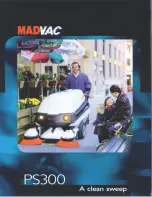
Check that the spark plug washer is in good condition
and thread the spark plug in by hand to prevent cross-
threading.
After the spark plug is seated, tighten with a spark plug
wrench to compress the washer.
NOTE:
When installing a new spark plug, tighten 1⁄2-turn
after the spark plug seats to compress the washer. When
reinstalling a used spark plug, tighten 1⁄8- to 1⁄4-turn after
the spark plug seats to compress the washer.
CAUTION!
The spark plug must be tightened
securely. A loose spark plug can become very hot
and can damage the engine.
Cleaning the Engine
If the engine has been running, allow it to cool for at least half
an hour before cleaning. Periodically remove dirt build-up from
engine.
CAUTION!
Do not spray engine with water to clean
because water could contaminate fuel. Using a
garden hose or pressure washing equipment can
also force water into the muffler opening. Water that
passes through the muffler can enter the cylinder,
causing damage.
WARNING!
Accumulation of debris around muffler
could cause a fire. Inspect and clean before every
use.
Off-Season Storage
Engines stored over 30 days need to be drained of fuel to
prevent deterioration and gum from forming in fuel system
or on essential carburetor parts. If the gasoline in your engine
deteriorates during storage, you may need to have the
carburetor, and other fuel system components, serviced or
replaced.
Remove all fuel from tank by running engine until it stops.
Change the engine oil.
Remove spark plug and pour approximately 1 oz. (30 ml)
of clean engine oil into the cylinder. Pull the recoil starter
several times to distribute the oil, and reinstall the spark
plug.
Clean debris from around engine, and under, around, and
behind muffler. Apply a light film of oil on any areas that
are susceptible to rust.
Store in a clean, dry and well ventilated area away from any
appliance that operates with a flame or pilot light, such as a
furnace, water heater, or clothes dryer. Avoid any area with
a spark producing electric motor, or where power tools are
operated.
If possible, avoid storage areas with high humidity.
Keep the engine level in storage. Tilting can cause fuel or
oil leakage.
4.
5.
1.
2.
3.
4.
•
•
•
Spark Plug
WARNING!
DO NOT check for spark with spark
plug removed. DO NOT crank engine with spark
plug removed.
WARNING!
If the engine has been running, the
muffler will be very hot. Be careful not to touch the
muffler.
To ensure proper engine operation, the spark plug must be
properly gapped and free of deposits.
Remove the spark plug boot and use a spark plug wrench
to remove the plug, Figure 7-2.
Visually inspect the spark plug. Discard the spark plug
if there is apparent wear, or if the insulator is cracked or
chipped. Clean the spark plug with a wire brush if it is to be
reused.
Measure the plug gap with a feeler gauge. Correct as
necessary by bending side electrode, Figure 7-3. The gap
should be set to .02-.03 inches (0.60-0.80 mm).
1.
2.
3.
Spark Plug
Spark Plug Boot
Figure 7-2
Figure 7-3
.02-.03 in.
(0.60-0.80 mm)
Electrode
19
s
ectiOn
7 — e
ngine
M
aintenance
















































